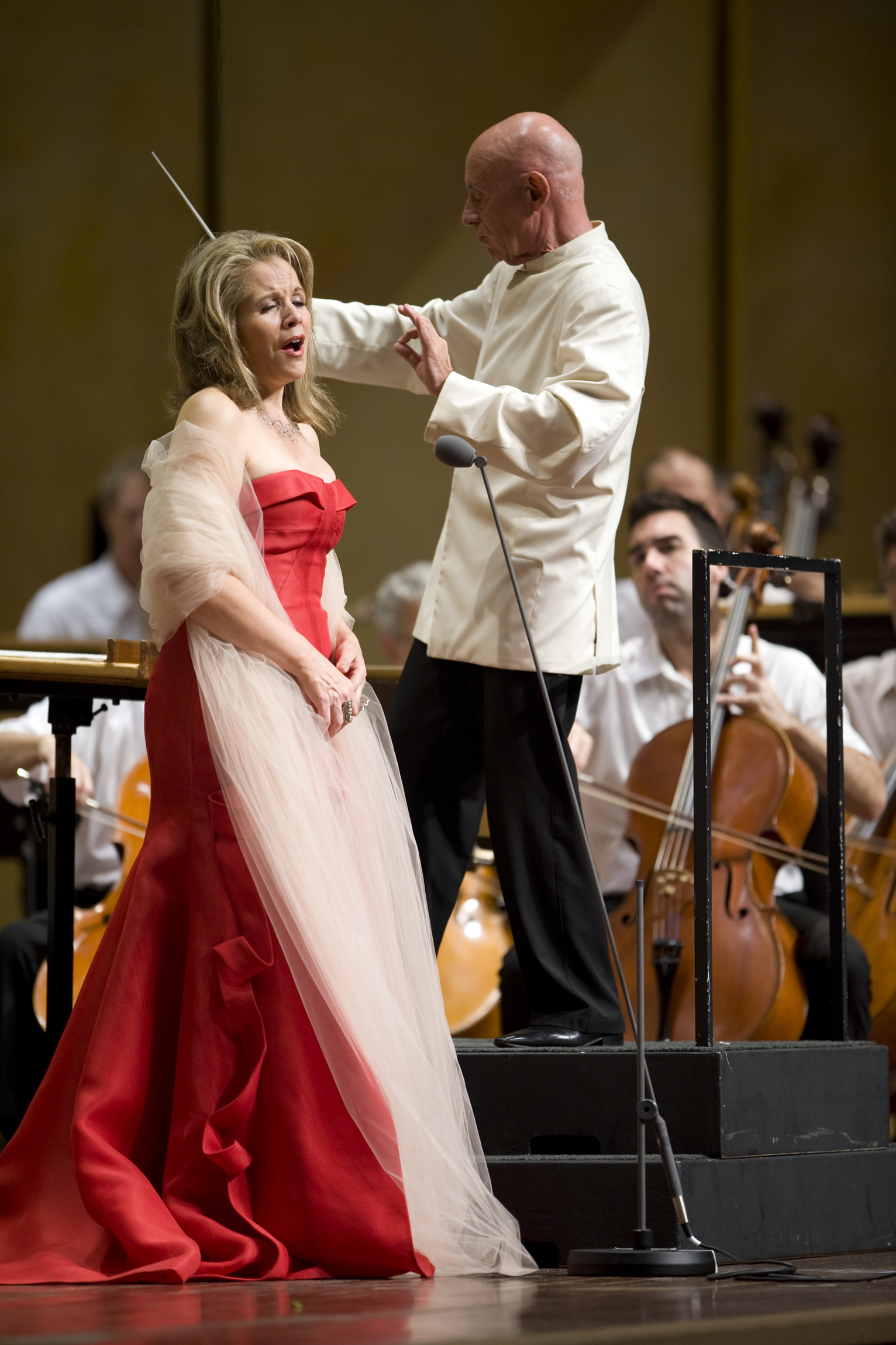Fleming’s Strauss soars on Eschenbach anniversary night at Ravinia

Renee Fleming performed Strauss's "Four Last Songs" with Christoph Eschenbach and the Chicago Symphony Orchestra Saturday night at Ravinia. Photo: Patrick Gipson/Ravinia Festival.
Rain threatened, but the onstage star power—in the person of American soprano Renee Fleming—was dazzling. So it was no surprise that the Ravinia Festival’s pavilion was nearly full and its damp lawns well-peppered with picnickers for the Chicago Symphony Orchestra’s concert Saturday night.
But the evening offered more than a superstar soprano reprising some of her signature repertoire (Richard Strauss’ Four Last Songs.) The wide-ranging concert also celebrated two major anniversaries: the 70th birthday year of Christoph Eschenbach, Ravinia’s music director from 1994 to 2003, and the 200th anniversary of the birth of Robert Schumann.
During his long career Eschenbach has been a mentor for many artists, among them Fleming, who sang her first operatic roles under Eschenbach’s baton two decades ago. Another former Eschenbach protégé, pianist Tzimon Barto, was on hand Saturday night, as soloist in two works by Schumann for piano and orchestra: Introduction and Allegro appassionato in G Major, Op. 92, and Concert-Allegro with Introduction in D Minor/Major, Op. 134. The concert opened with the CSO’s horn section as solo ensemble in Schumann’s Konzertstück in F Major, Op. 86.
The Schumann repertoire was well-chosen, a bracing mix of the familiar and the relatively obscure. (Both Schumann piano works were receiving their Ravinia premieres.) The Konzertstück is a famous showcase for horn players, and the CSO solo quintet—Principal Dale Clevenger, Associate Principal Daniel Gingrich, James Smelser, David Griffin and Oto Carrillo—played it with zest and high spirits. Justly fabled over the years for its precision and expressive phrasing, the CSO’s horn section has hit some high-profile rough patches during performances this past season. But the ensemble’s golden, mellow tone was nicely blended Saturday night and bobbles were virtually non-existent.
Ravinia had planned a four-concert celebration for Eschenbach’s 70th birthday year, but tendonitis kept him from appearing as pianist in programs on Thursday and Friday. On the podium Saturday night, however, he offered all the poetry and drama that audiences remember from his tenure as Ravinia’s music director.
Schumann is especially close to Eschenbach’s heart, and he and Barto were sympathetic colleagues in both Schumann pieces for piano and orchestra. In the Introduction and Allegro-appassionato, Barto’s limpid, introspective opening phrases unfolded gently, stirring up responses from solo horn and oboe that floated overhead like wispy clouds. In the more overly virtuosic Concert-Allegro, Barto’s octave runs were fierce and crisp, and he brought a rapt, rhapsodic quality to the extended cadenza. But the interplay between soloist and orchestra during the piece’s abrupt mood shifts was smooth and spontaneous.
Fleming and Eschenbach have been frequent partners in the Four Last Songs, recording the Strauss cycle together in Houston, and their performance Saturday had the relaxed quality of two colleagues who know each other well. Fleming’s voice has lost some of its creamy edge, but she floated Strauss’ long, plaint lines with easy grace and a bright, rich tone. She was most impassioned in the two encores: Strauss’ Cacilie and Marietta’s Lied from Erich Wolfgang Korngold’s Die tote Stadt. In the Strauss, appealing to an absent lover, she was as ardent as a love-obsessed teen-ager. Only a fool would decline such a beguiling invitation.